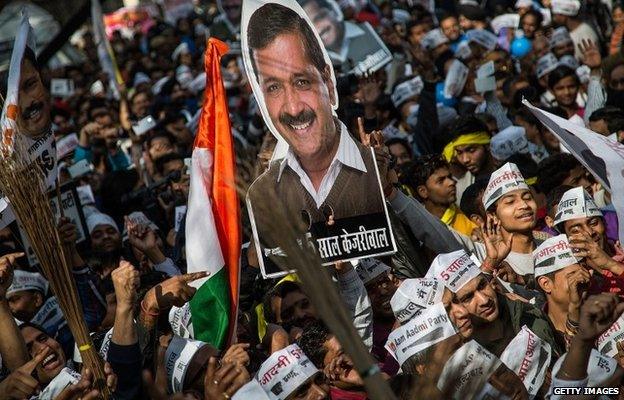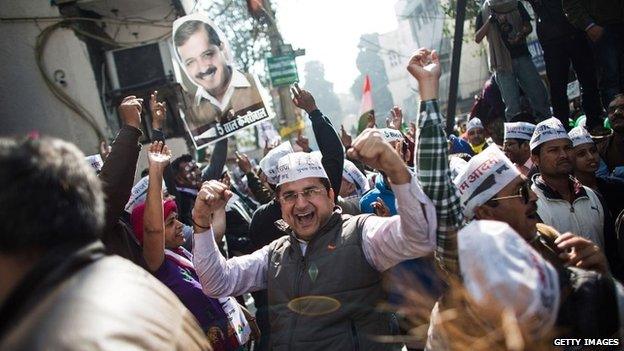India's Arvind Kejriwal makes an epic comeback
- Published

Arvind Kejriwal is headed for a landslide win
As political comebacks go, Arvind Kejriwal's is surely epic.
Written off by his rivals and the media after suffering a drubbing at the hands of Narendra Modi's resurgent BJP in last May's general elections, India's most famous anti-corruption campaigner has bounced back.
The former tax inspector took on a ruling party at the peak of its power and felled it in the national capital. For sheer symbolism, Mr Kejriwal's victory in Delhi is astounding, the proverbial David slaying the all-mighty Goliath. The scale of the BJP's defeat, external makes Mr Kejriwal's win truly extraordinary.
How did India's most powerful and richest party - with its charismatic leader, fabled organisational skills and political nous - get it so wrong?
A little over a year ago, the BJP picked up 32 of 70 seats in hung elections, external to the Delhi state assembly. Last May, it took all seven of the capital's parliamentary seats, as well as bordering the capital. It rolled out the heavy artillery against Mr Kejriwal in Delhi - Mr Modi himself led the campaign, helped by nearly two dozen federal ministers and 120 MPs. But to no avail. "This is not just a defeat for the BJP, this is a decimation in a high-profile election," says Swapan Dasgupta, a columnist who is no admirer of Mr Kejriwal.
For one, Mr Kejriwal launched his campaign to regain Delhi as early as last July. Most believe the anti-corruption campaigner's masterstroke was telling people that he was sorry for quitting in haste after a chaotic 49-day stint in power following an impressive debut in the December 2013 state polls. He went to every neighbourhood and slum to beg forgiveness. "We have made a mistake", he told people, "but we haven't sinned." In a country where politicians are increasingly seen as aloof and arrogant, Mr Kejriwal's atonement worked wonders. Every comeback needs true believers, and Delhi's voters believed him.
Mr Kejriwal also drove a positive - and populist - campaign focusing on Delhi, external. The BJP surprised many by running a personal campaign against Mr Kejriwal. It was, most said, bound to backfire.
The fact that Mr Kejriwal's party won more than half of the popular vote - the highest by any party in Delhi ever - also points to the fact that his supporters transcended class and religion: the poor and the minorities appear to have backed him, and a large section of the middle class, which had deserted him, returned. One young professional, who voted for the BJP in May, told me he was voting for Mr Kejriwal this time because he was unnerved by Mr Modi's failure to gag his party's radical fringe., external
But more importantly, say analysts like Neerja Chowdhury, "voters in Delhi also reacted to the BJP's arrogance of power". The BJP is a cadre-based party with deep roots in Delhi. Analysts say voters did not take kindly to former policewoman Kiran Bedi being introduced at the last-minute as the BJP's chief ministerial candidate. Also, Mr Kejriwal represents what many say is a refreshing brand of unostentatious politics, far removed from the flashy political culture associated with both the BJP and Congress. "Hope has returned," said AAP leader Yogendra Yadav.

The AAP got support from all sections of the population in Delhi
It won't be easy. Mr Kejriwal faces considerable challenges in governing one of the world's megacities. Although petty corruption was kept in check, his shambolic 49-day government did not inspire much confidence. Delhi is a complex city-state where 40% of the people are migrants and faces serious problems with water, electricity, housing, air pollution and choking traffic. Can Mr Kejriwal shed his activist mode and make the kind of compromises that come with governance? Analyst Ashish Nandy says the AAP's win is a "return to politics of populism". But just how much populism can Delhi - and India - afford?
For Mr Modi and the BJP, defeat marks the end of the honeymoon period and they are stripped of their aura of invincibility.
Now, fractious - and largely discredited - opposition parties across the country will be emboldened and begin believing they can take on the BJP. That will be easier said than done. Congress, which has drawn a complete blank for the first time in Delhi, appears to be facing an existential crisis. "This is a big morale booster for India's opposition parties," says Neerja Chowdhury. But it will take a lot more effort to translate that spirit into votes against the BJP across the country.